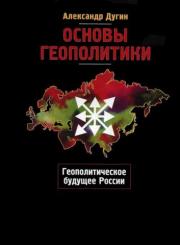
Foreword to Foundations of Geopolitics
Author: Alexander Dugin
Translator: Jafe Arnold
Foreword to Foundations of Geopolitics: The Geopolitical Future of Russia (Arktogeya, Moscow: 2000)

Foreword
The history and fate of geopolitics as a science is paradoxical. On the one hand, the concept itself seems to have become customary and is actively used in modern politics. Geopolitical journals and institutes have multiplied, the texts of the founders of this discipline are being published, conferences and symposia are being organized, and geopolitical committees and commissions have been created.
Yet nevertheless, to this day geopolitics has still been unable to enter the category of conventionally recognized sciences. The first geopolitical works of the German Ratzel, the Swede Kjellen, and especially the Englishman Mackinder have been met with hostility by the scientific community. Classical science, fully inheriting the hyper-critical spirit of early positivism, has considered geopolitics to be an “over-generalization,” and consequently it is believed to be little more than a variety of “charlatanism.”
In a sense, the sad fate of geopolitics as a science has been associated with the political side of the problem. The opinion has been approved that the war crimes of the Third Reich’s expansion, the war, deportations, etc. were to a significant extent theoretically prepared by German geopoliticians who allegedly supplied Hitler’s regime with a pseudo-scientific basis (first and foremost, this refers to Karl Haushofer, the German geopolitician who at one time was quite close to the Fuhrer).
However, German geopolitics, on a theoretical level, is essentially no different from Anglo-Saxon geopolitics (Mackinder, Mahan, Spykman), French geopolitics (Vidal de La Blanche), or Russian “military geography” (Milyutin, Snesarev), etc. The difference lies not in the specific views of Haushofer, which were entirely logical and adequate for the discipline, but in the methods by which a number of his geopolitical positions were realized. Moreover, the specific foreign policies of Germany in the ’30’s and ’40’s in their most repulsive manifestations were diametrically opposed to the ideas of Haushofer himself. Instead of a “continental bloc” along the axis of Berlin-Moscow-Tokyo, there was the attack on the USSR; instead of an organic understanding of the doctrine of Lebensraum, or “living space” (in the spirit of Schmitt’s theory of “people’s rights”), there was vulgar nationalism and imperialism, etc. It should be noted that Haushofer’s school and his journal Zeitschrift fur Geopolitik were never official elements of the Nazi system. As with many intellectual groups of the so called “conservative revolutionaries” in the Third Reich, their ambiguous existence was simply tolerated, and this tolerance varied depending on political conditions at a given moment.
However, the main reason for the historical suppression of geopolitics is the fact that it too openly reveals the fundamental mechanisms of international politics which various regimes often prefer to hide behind vague rhetoric or abstract ideological schemes. In this sense, it is possible to cite the parallel with Marxism (at least in its, scientific, analytical aspect). Karl Marx more than cogently revealed the mechanics of relations of production and their connections with historical formations, just as geopolitics exposes the historical demagogy of foreign policy discourse and shows the real deep levers which influence international, inter-state, and inter-ethnic relations. But if Marxism is a global revision of classical economic history, then geopolitics is a revision of the history of international relations. The latter explains the ambivalent attitude of society towards geopolitical scholars. The scientific community stubbornly refuses to tolerate them in their midst and harshly criticizes them, often without even noticing that, on the contrary, authorities use geopolitical calculations to formulate international strategy. Such, for example, was the case with one of the first geopoliticians, the true founding father of the discipline, Sir Halford Mackinder. His ideas were not accepted in academic circles, but he himself directly participated in the formulation of English policies for the first half of the 20th century, laying the theoretical basis for the international strategy of England which was passed on to the US in the middle of the century and developed by Mackinder’s American (or, more broadly, Atlanticist) followers.
In our opinion, the parallel with Marxism is a successful one. A method may be adapted and utilized by different poles. The Marxist analysis is important for both the representatives of Capital and fighters for the emancipation of Labor. Geopolitics is important for both the representatives of large states (empires), as it instructs them how to best preserve territorial domination and carry out expansion, and their opponents for whom geopolitics presents the conceptual principles of the revolutionary theory of “national liberation.” For example, the Treaty of Versailles was the work of the hands of Mackinder’s geopolitical school which expressed the interests of the West and aimed at weakening the states of Central Europe and the suppression of Germany. The German student of Mackinder, Karl Haushofer, proceeding from the same assumptions, developed a directly opposing theory of “European liberation” which was a total negation of the logic of Versailles and which formed the basis of the nascent ideology of National-Socialism.
These considerations show that even though it has not been accepted into the commonwealth of classical sciences, geopolitics is extremely effective in practice and its value is superior in some aspects to many conventional disciplines.
Be that is at may, today geopolitics exists and little by little it is gaining official recognition and the corresponding status. However, not everything is going smoothly in this process. Very often we are faced with a confusion of the concept of “geopolitics,” whose increasing use is becoming common place among non-professionals. The focus is shifted from the complete and global picture, developed by the founding fathers, to limited regional points of geo-economic schemes. The original postulates of geopolitical dualism, competing strategies, civilizational differentiation, etc. are either ignored, hushed, or denied. It is difficult to imagine something similar in any other science. What would happen to classical physics if, operating with the concepts of “mass”, “energy”, “acceleration”, etc., scientists started to implicitly, gradually deny the law of gravity, forget about it, and simply recognize that Newton was “a mythological figure never having existed in reality” or a “dark religious fanatic?” But it is precisely this, mutatis mutandis, which is happening with geopolitics in our time.
The purpose of this book is to present the basics of geopolitics objectively and impartially beyond preconceived notions, ideological sympathies and antipathies. No matter how we treat this science, we can only have a definite opinion of it upon being acquainted with its principals, history, and methodology.
